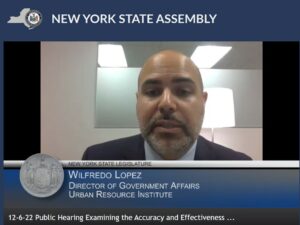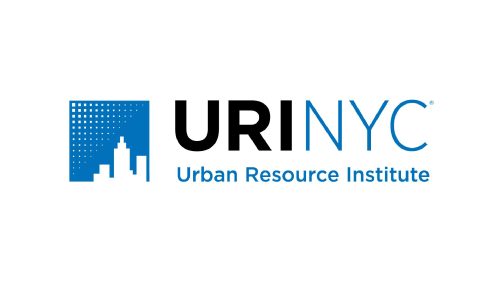Watch the full recording of the Public Hearing here
Good morning. I am Wilfredo Lopez, Director of Government Affairs at Urban Resource Institute (URI). URI has been in operation for 40 years and in that time has grown to become the largest domestic violence (DV) shelter provider in the country. URI currently provides close to 1,200 beds to victims of domestic violence on any given evening and will be increasing Tier II capacity in the future. URI is committed to developing and delivering innovative, client-centered and trauma-informed services to survivors of domestic violence and their families, families experiencing homelessness and other vulnerable populations, including those who do harm. Thank you for the opportunity to present testimony today and for shedding light on this issue of critical importance.
To be sure, the consumer credit reporting system plays an outsize role in an individual’s ability to apply for credit, take out a loan, buy a home or lease an apartment and participate in other aspects of everyday life. As has already been pointed out, the system is ripe for reform, as “material errors” are common and have significant, long-term deleterious impacts on one’s “creditworthiness.”
However, even when operating optimally, the consumer credit reporting system does not adequately serve the needs of a class of particularly vulnerable consumers, consumers who have experienced domestic violence, and more specifically economic abuse.
Economic abuse is pervasive: nearly all survivors of domestic violence (between 94-99%) report that they have experienced economic abuse. The 2022 reauthorized Violence Against Women Act defines economic abuse as:
(b)ehavior that is coercive, deceptive, or unreasonably controls or restrains a person’s ability to acquire, use, or maintain economic resources to which they are entitled, including using coercion, fraud, or manipulation to restrict a person’s access to money, assets, credit, or financial information; unfairly use a person’s personal economic resources, including money, assets, and credit, for one’s own advantage.
Some common examples of economic abuse include taking all or part of a domestic violence survivors’ income, limiting their ability to work, restricting them from accessing their identification and other personal documents, identity theft, and coerced debt.
Identity theft is often a common occurrence for survivors and one that is not always easily rectified. In order to remove fraudulent activity from a credit report, a survivor must file an identity theft police report. In New York City, survivors can to go to any precinct and obtain this police report. Unfortunately, survivors report that when police hear that the person has experienced domestic violence, they have said things like “this is a family issue not a police issue” or take it less seriously and refuse to file a police report. This in turn saddles the survivor with the debt they did not even know they had and affects their ability to find housing and move forward.
In the context of economic abuse, coerced debt is a non-consensual debt incurred through fraud, duress, intimidation, threat, force, manipulation, or undue influence. Abusive partners often use force or threat of force to open credit card accounts, take our loans using a survivor’s name, or do so without their knowledge. According to Reinvesting in Economic Justice, Equity, and Solidarity, for Survivors in New York City: A Survivor-Centered Policy Platform & Recommendations for Coerced Debt, Housing, Public Benefits & Solidarity Economy, in New York City alone, more than one in three survivors of domestic abuse who need domestic violence-related consumer services also have a consumer credit issue.
Survivors cite financial obstacles as among the top reasons they stay or return to an abusive relationship. Even when a survivor is able to leave, the impacts of financial abuse and coerced debt last long after the abuse ends and has wide-ranging impacts on a survivor’s life. Accumulated coerced debt can make it difficult for a survivor to qualify for housing, get a new cell phone, take out an auto loan, or access the capital needed to rebuild a life of safety and stability. Consumer collection agencies repeated attempts to collect a coerced debt could re-traumatize a survivor who has recently escaped danger, and judgments against survivor “debtors,” whether by default or otherwise, can lead to wage garnishments. As currently designed, the system places the considerable burden of proving that a debt has been coerced on a survivor, but neglects to provide survivors with effective tools to do so.
Though other states have adopted legislation governing the classification and treatment of coerced debt, there are no laws on the books in New York specific to coerced debt. The laws and regulations that do exist are inadequate to address the unique needs of survivors of domestic violence. Survivors of domestic violence cannot raise coerced debt as a defense in civil, criminal or matrimonial claims unless they have filed an identity theft claim with law enforcement. Because of poor training and institutionalized biases, law enforcement is ill equipped to handle these types of cases. This leaves most survivors holding the bag for hundreds and sometimes-even thousands of dollars in debt they did not incur.
URI has been working with a broad coalition of advocates to develop survivor-centered solutions to economic abuse. Recently, we have collaborated with Assembly Member Linda B. Rosenthal on new legislation; bill A.10677 that would allow a victim of coerced debt to provide notice and evidence to a debtor or collection agency that a particular debt is coerced. The bill would create a process whereby the debt collector would be required to investigate the debt and upon sufficient evidence and without a finding of identity theft, relieve the survivor of the legal responsibility of paying for the debt.
The creditor would then be required to contact the credit reporting agencies to remove the debt from the survivor’s report and would then be empowered to attempt to collect the debt from the abusive party. The legislation specifically creates a cause of action for survivors of coerced debt, which would, under certain circumstances, allow them to seek a declaratory judgment that a debt is coerced, which would make the abusive person civilly liable to the creditor for the debt or to the survivor, if they have already paid off all or some of the debt. California, Texas and a handful of other states have adopted similar protections for survivors, and the federal government, via the Consumer Financial Protection Board, has recently promulgated regulations to block the reporting of adverse information to credit reporting agencies that resulted from sex trafficking.
While all consumers need protections against the inadequacies of the consumer credit reporting system, survivors of domestic violence have suffered disproportionately from a system that is blind to their specific needs. As we focus on this work, it is vital that we recognize that many survivors who escape physical violence live with a lifetime of financial scars that the Legislature has the unique power to address.
URI looks forward to working with the Members of the Committees on Consumer Affairs and Protection and Banking, along with Assembly Member Linda B. Rosenthal, to see this bill become law.
Thank you.

